WhatsApp for Real Estate: An All-in-One Guide in 2026

As WhatsApp has become a go-to choice for many businesses that interact with their customers on a regular basis, real estate is an industry that is relying on traditional channels. This is because WhatsApp has been known to show success in the fields where customers take action instinctively.
In comparison to that, real estate purchases require significantly more thought before going forward with the buying decision. Also, the sales cycle is pretty long in the real estate industry since buyers go back and forth before finalizing a deal.
Although WhatsApp is more suited for businesses with shorter customer journeys, that doesn’t mean it can’t be used by the ones where decision-making processes are longer. Realtors can use WhatsApp to nurture sales-qualified leads and schedule site visits effectively.
With its large user base and automation functionality, you can easily utilize WhatsApp to interact with prospects at the right time. You can also implement customized workflows to automate many of the repetitive process activities.
That being said, in the guide post, I will explain how you can leverage the dynamic capabilities of WhatsApp for your real estate business to close deals effortlessly.
Benefits of using WhatsApp for real estate
Before we jump into how you can start implementing WhatsApp into your outreach strategy, let’s take a look at some of the advantages offered by WhatsApp:
Prompt conversations
By using WhatsApp, you can effectively communicate with incoming requests about new projects or available properties without letting the prospect wait hours. Doing so, you minimize the chances of letting a lead slip or change their mind.
With two-way, real-time chats, WhatsApp allows you to share information about your real estate holdings and other amenities to encourage prospective buyers to book a site visit or physical meeting.
Visual support
No amount of words can equate to visuals when it comes to explaining something. WhatsApp streamlines this by enabling you to send interior/exterior images of the property, videos of designs, and catalogs to give prospects an experience like they are seeing the property themselves.
Sharing visual details with the customers also lets them figure out a place that best fits their needs, significantly cutting down on the browsing time.
Workflow automation
To ensure shoppers do not have to wait to hear back from you, you can make use of the WhatsApp chatbots to handle incoming queries automatically. You can use the chatbot to resolve common questions buyers might have about the properties while also asking relevant questions of your own to gauge their interest level.
Quick responses allow you to not just optimize the customer journeys but enhance customer experience, establishing a long-term relationship for prolonged success.
Resource-efficient channel
WhatsApp Business Platform is a complete suite that provides all the necessary features your real estate business needs to achieve success. For instance, you can send bulk WhatsApp messages to reach out to your target audience or schedule timely messages to keep them interested in your offerings.
All of this can be done from a unified channel, saving you the hassle of subscribing to multiple tools for every process.
Delivering a quality experience
Buyers like it when businesses listen to them and answer their inquiries without making them jump through multiple hoops. WhatsApp is the most used communication app in the world. So, the chances are high that your clients are already using it.
Additionally, the information shared through WhatsApp stays within a single chat interface, so the clients can review it as many times as they want. This aspect significantly increases customer engagement because they don’t have to visit your site or contact you numerous times to ask for these details.
Verified business profiles
In the real estate industry, you are not dealing with everyday purchases. You are asking prospects to make a huge decision of getting your property. For this process to happen seamlessly, you have to build trust with them. And what better way to do that than to have a verified WhatsApp Business profile?
With a well-crafted WhatsApp Business profile, your prospects can clearly tell who is reaching out to them and whether you are a credible source or not. Although you can reach out to interested buyers using a personal WhatsApp account, it doesn’t provide the same impression as a business account does.
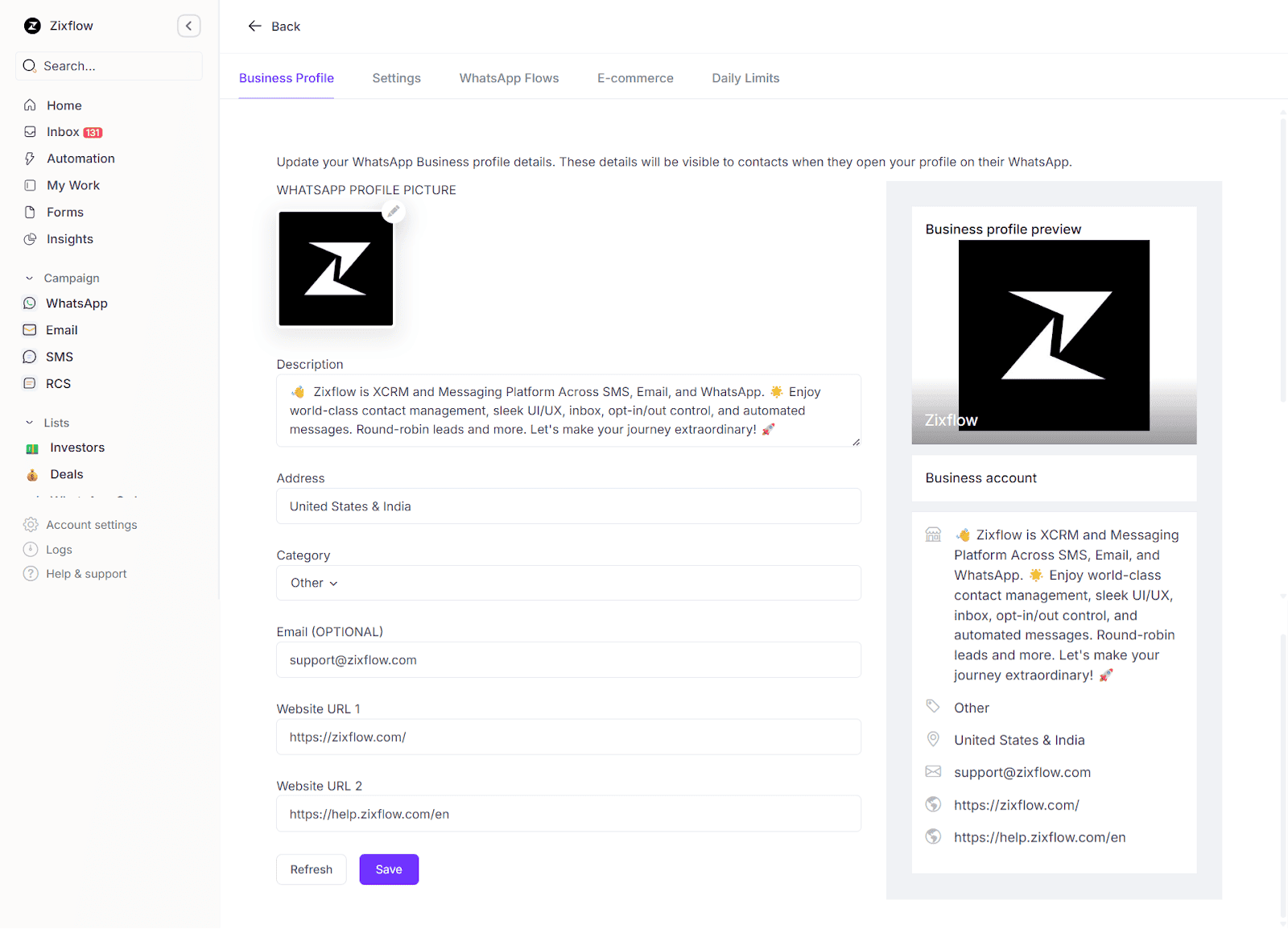
Furthermore, if multiple sales reps are contacting prospects via personal WhatsApp accounts, the conversation becomes complex as each representative has a separate chat going on with the buyer. This is not the case with a WhatsApp Business account.
Using this, no matter how many reps are communicating with a lead, all the messages are a part of a singular chat, simplifying the process and making information more easily accessible.
Manage property inquiries on WhatsApp with Zixflow.
Use Zixflow to automate responses, qualify leads, and book site visits using automated workflows.
Login TodayHow are brands using WhatsApp in the real estate industry
From the initial engagement to sealing the deal, there are a lot of hurdles you have to overcome to sell a property. WhatsApp, by itself, handles a lot of them automatically. So, your reps only have to concentrate on meeting with clients and closing the deal.
Having said that, below are some of the use cases of how real estate companies are using WhatsApp to streamline their sales journeys:
Acquiring qualified leads
Buying a house is different than purchasing a smartphone. Apart from the budget, there are a ton of other elements clients consider before finally coming to a decision. This goes to show that the target audience interested in buying a property differs from casual customers.
With WhatsApp, you can find the right target market that might be interested in your real estate portfolio. To do that, there are a couple of ways:
- You can embed a WhatsApp chat widget on your website that interested visitors can click to learn more about your projects.
- You can send WhatsApp forms to pre-targeted leads to understand their requirements.
Using these methods, you can drive visitors to your WhatsApp channel and compel them to continue their search or reach out to you via WhatsApp.
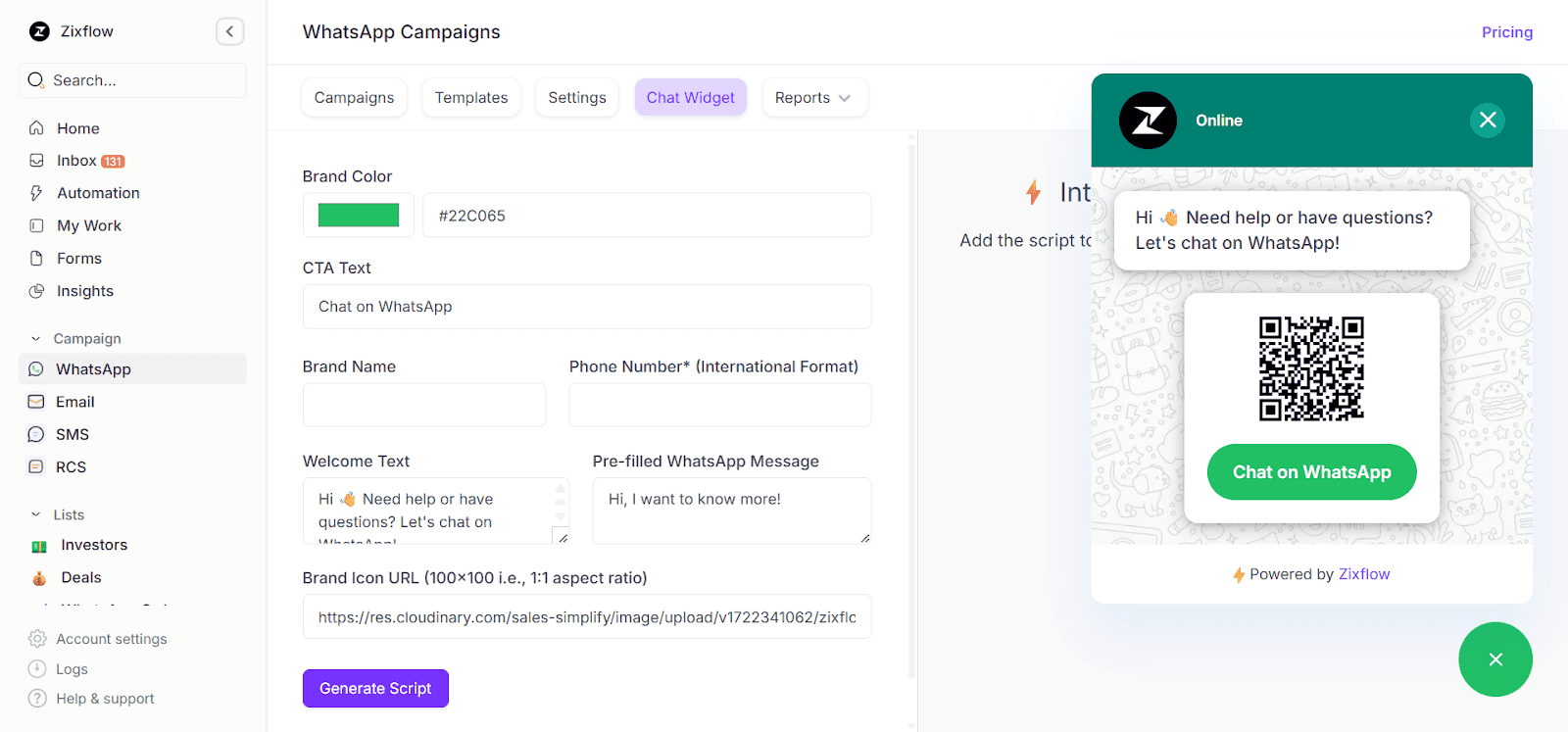
Prompt updates
Many times, it happens that as soon as a new project is launched or is opened for bookings, high demand causes it to immediately sell out. These quick updates need to be delivered to interested buyers so they don’t miss out on getting their own.
By using WhatsApp, you can instantly send the updated status of the remaining properties to let the prospects know whether they should hurry or not. Plus, you can share the latest details about the properties, like price changes or discounts, further enticing buyers to book theirs as quickly as possible.
For example, Puravankara Limited, a leading name in the Indian real estate landscape, designed a conversational WhatsApp chatbot using Zixflow to handle customer engagement in real time and address queries in a timely manner. The result? 50% more leads and a 30% increase in response rates.
Read the complete case study on how Purvankara doubled its conversations with Zixflow.
Scheduling meet-ups
Back-and-forth calling or sending follow-up emails to figure out when it is the right time to meet with the client is a hassle. In confusion, there is a chance that the buyer will forget about their appointment, which will lead to an increased no-show rate and waste of resources.
WhatsApp lets you eliminate this problem by setting up appointments and sending reminders a couple of hours before the meeting time to make sure prospects don’t miss out on the opportunity. In addition to that, you can integrate appointment apps like Calendly with your WhatsApp API provider to let leads pick the time that best suits their schedule.
How to get started with WhatsApp for your real estate business?
By now, you must have gotten a good idea of how to utilize WhatsApp to enhance your customer interaction and close deals more effectively. With that said, let’s check out how to get started with WhatsApp if you have never used it before for your real estate business:
Get the WhatsApp Business API
Getting started with WhatsApp for your real estate business begins with setting up the WhatsApp Business API. It is a straightforward process where you have to provide your business details to Meta and create a WhatsApp Business Manager.
Although you can set up the WhatsApp Business API on your own, you will need a WhatsApp tool to serve as a frontend platform to use the API. For the sake of simplicity, let’s take Zixflow, a Meta-partnered WhatsApp Business Service Provider.
To begin with, sign up for an account on Zixflow and navigate to the WhatsApp section. Once here, you can start integrating WhatsApp into the platform. Click on the Add Number button and follow the on-screen instructions to link the WhatsApp API with Zixflow.
You can also watch this video, which explains this process in detail:
After you are done connecting both solutions, the next step is creating a chatbot.
Set up a WhatsApp chatbot
Real estate inquiries can come in at any hour, and potential buyers expect quick answers. Zixflow’s WhatsApp chatbot capabilities allow you to automate responses to frequently asked questions, qualify leads based on budget or location, and book appointments instantly.
You can create personalized bot flows using Zixflow’s no-code builder to handle everything from initial contact to detailed property suggestions. This ensures that every lead receives immediate attention while your team focuses on high-intent conversations.
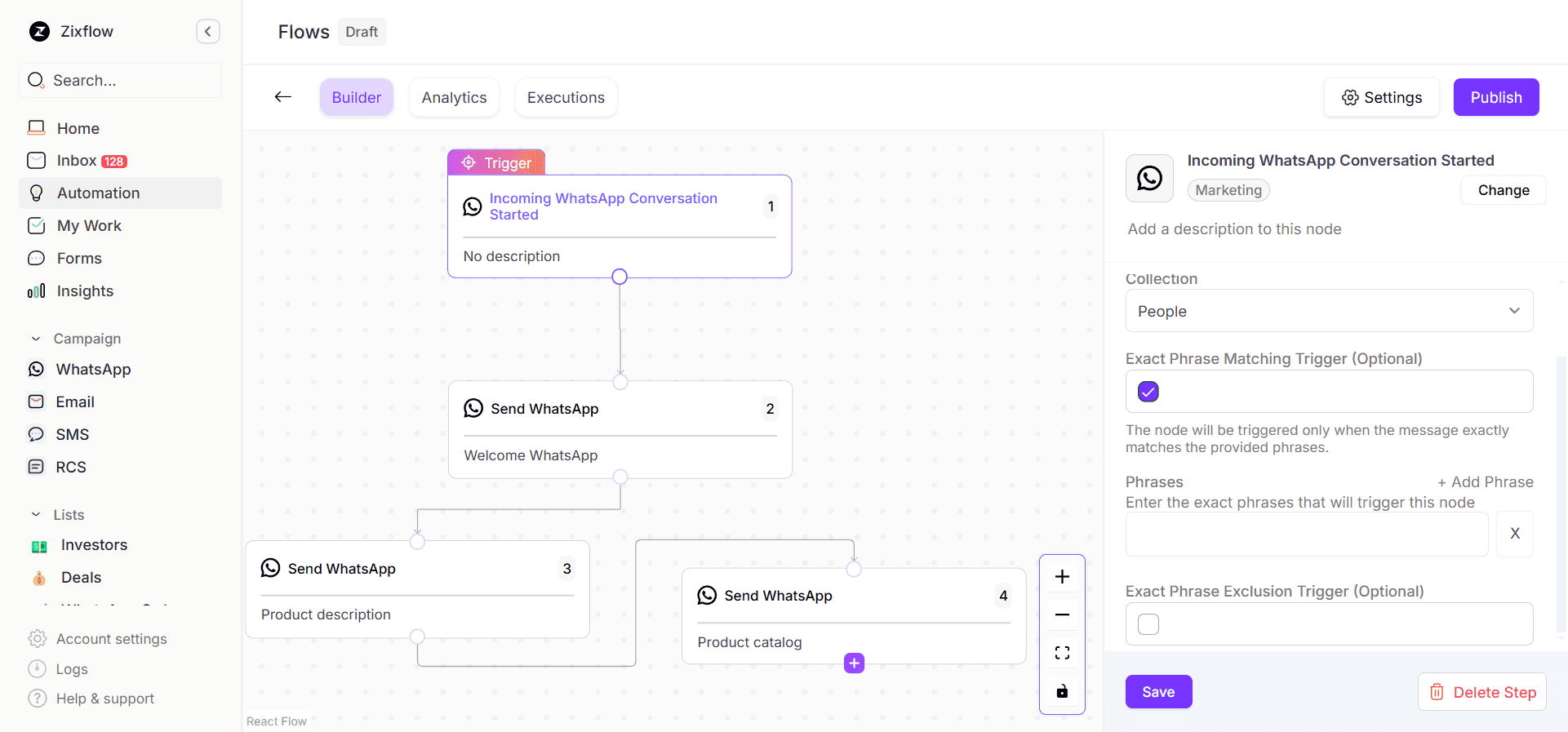
Leverage WhatsApp Flows
With Zixflow’s support for WhatsApp Flows, you can design rich, guided user experiences within the chat itself. For your real estate business, this means you can walk users through property preferences, schedule viewing appointments, and even get client feedback, all in a structured way.
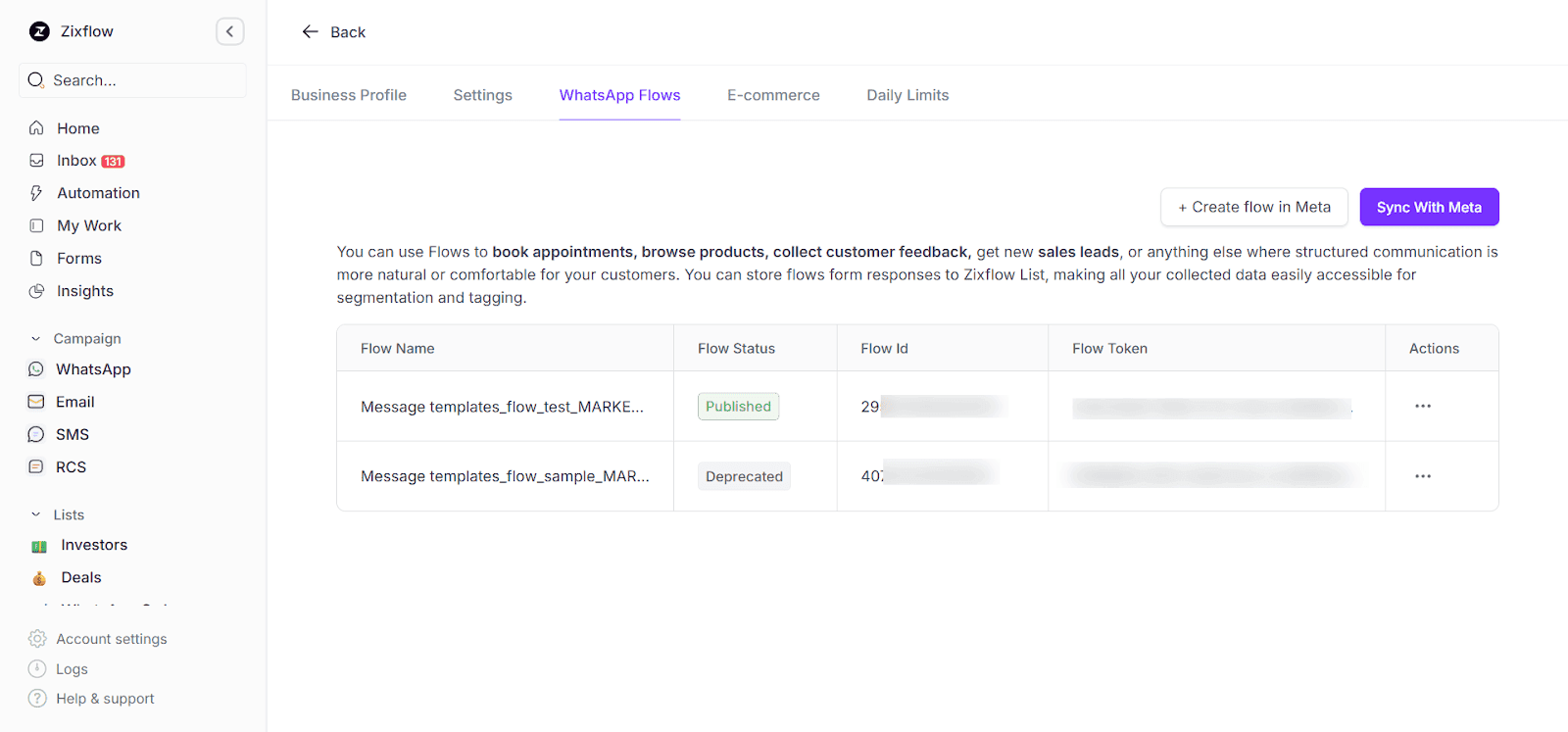
Our guide on WhatsApp Flows will help you understand what they are and how you can create them using the WhatsApp Business Manager.
Automate your lead follow-ups with WhatsApp chatbots.
Zixflow helps real estate teams stay responsive with custom WhatsApp chatbots to interact with potential leads 24/7.
Try Out TodayRun bulk WhatsApp messaging initiatives
Property promotions, open house invites, and market updates can be sent to large contact lists using Zixflow’s bulk messaging feature. You can segment your audience based on location or buying intent into separate lists and then send personalized WhatsApp campaigns that resonate with each group.
Whether you are promoting a luxury apartment or newly available rental properties, Zixflow enables you to deliver targeted messages at scale while remaining compliant with WhatsApp’s messaging guidelines.
With a campaign builder that is intuitive, running WhatsApp marketing campaigns is a breeze. You also get a preview of the message that you are sending below the template section, allowing you to see and customize how the message will look on the recipient's devices.
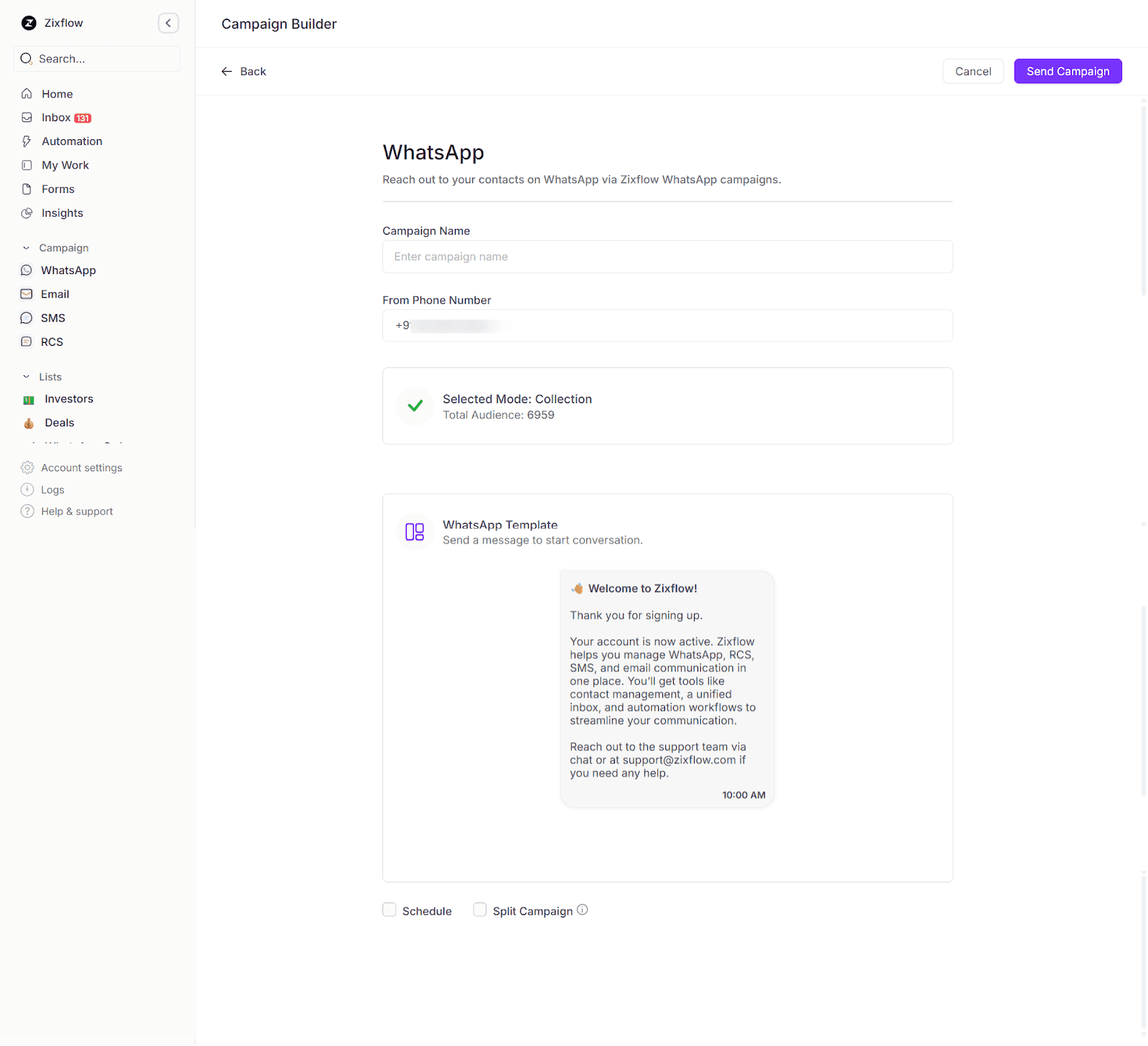
Monitor campaign effectiveness from a centralized dashboard
Once your campaigns are live, it is crucial to track performance. Zixflow offers a unified reporting panel where you can monitor key metrics such as message delivery, read, click-throughs, and open rates.
For real estate businesses, this means you can see which property listings are gaining traction, how many users are interacting with your messages, and which type of messages are driving the most engagement.
With these analytics, Zixflow empowers you to make data-driven decisions and continuously refine your WhatsApp strategy for better results.
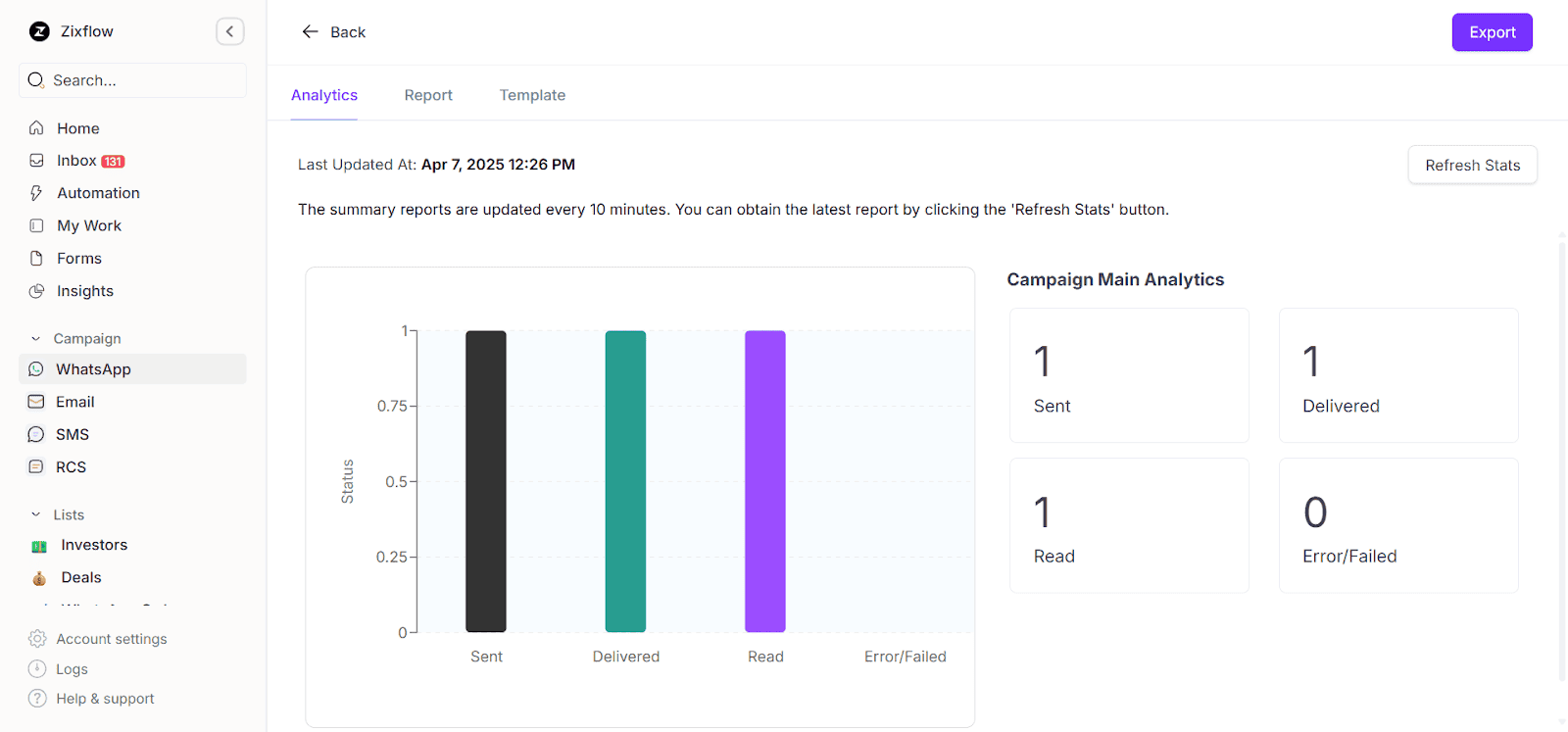
Start leveraging WhatsApp for your real estate business to sell more effectively
As digital communication gains traction, people are using online channels to make purchasing decisions, as big as buying a property. For this reason, WhatsApp has become an indispensable communication tool for modern real estate businesses.
From handling property inquiries to sending personalized updates and automating lead nurturing, it offers a direct and engaging way to connect with potential buyers and renters.
In an industry where personalization and follow-ups can make or break a sale, using WhatsApp, you can ensure that no opportunity slips through the cracks. You are equipped with the necessary features to deliver a seamless client experience via WhatsApp.
Having said that, to truly make the most of WhatsApp, you need an equally powerful platform. By leveraging Zixflow’s reliable functionalities, you can go beyond just messaging and build relationships with streamlined operations.
With features like intelligent chatbots, interactive flows, and bulk messaging, Zixflow empowers you to manage every aspect of your client communication from an easy-to-use platform. No matter if you are a solo agent or a large real estate firm, Zixflow helps you stay efficient in a competitive market.
So, are you ready to take your real estate business to the next level? Sign up on Zixflow today and start transforming your WhatsApp conversations into high-converting customer journeys.
